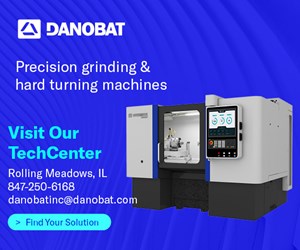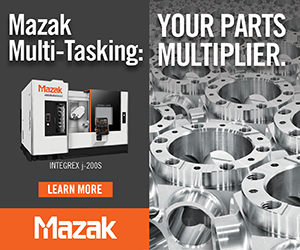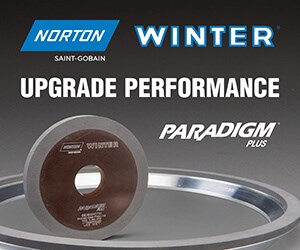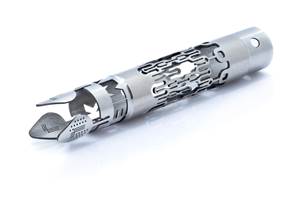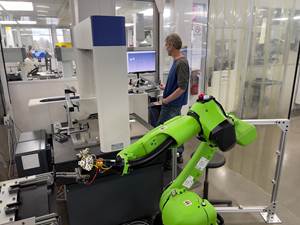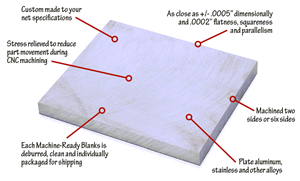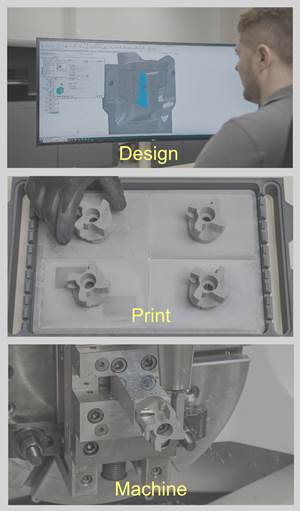Creating Prostheses From Existing IGES Surface Models, Blueprints
The process of melding digitized data with orthographic data to create a new product can be a process fraught with headaches. And it requires having the right equipment to get the job done.
The process of melding digitized data with orthographic data to create a new product can be a process fraught with headaches. Staying competitive requires an understanding of the functionality of the final product as well as the many processes involved in its manufacture. It also requires having the right equipment to get the job done. The viability of a product in the marketplace may well be determined by its manufacturability. Taking all of the requirements into account, Tecnico, Inc., a company in Tustin, California, that specializes in the design and construction of plastic injection molds and molds for investment casting industry, house the best engineering and manufacturing equipment for the creation of such products. Nick Krill, the president of Tecnico and the person who started the company 20 years ago, has built an organization adept at keeping pace with the ever changing demands of the marketplace and acquired the technical expertise required to take on such a product development. He and his staff have extensive experience in part prototyping and mold design, even reverse engineering.
Recently, Tecnico was challenged to create 14 investment casting molds for femoral knee prostheses by combining information taken from IGES files of existing surface models, design blueprints, and part prototypes to create a new model. The goal was to create molds for knee implants that would combine the best of what already existed. Tecnico was given just four weeks to ship the first mold, with a continued delivery schedule of one mold each week thereafter. Undaunted, Mr. Krill and his staff turned to their on-site equipment and completed the task perfectly and on time. One piece of equipment used was the Anvil-5000, a fully-integrated CADD/CAM/CAE software system by Manufacturing and Consulting Services, Inc. (MCS) of Scottsdale, Arizona.
In the past, Tecnico used Anvil-5000 in conjunction with a Sheffield coordinate measuring machine (CMM) with digitizing software to create products as diverse as golf clubs, jet engine components, and prosthetic implants. Anvil-5000 was of pivotal importance to the success of such products.
First, Tecnico engineers received floppy diskettes containing IGES information from the client defining portions of the knee geometry. These files were opened into Anvil-5000. Since Anvil-5000 is compatible with most industry-standard interfaces, including DXF, STEP, VDAFS, Patran, and IGES, the files translated quickly and seamlessly without data loss. Once the data was confirmed to be intact, it was stored in Anvil-5000's database to be used later.
The next step was to create surface models of the missing knee geometry in Anvil-5000 from blueprint data and combine it with the existing IGES files to complete the part definition. Anvil-5000 was then utilized to add the shrink and twist factors to the resultant surface model to compensate for the changes induced by the casting process. This new surface geometry was used to machine the EDM electrodes for manufacturing the final molds. NCPost, the numerical control postprocessor in Anvil-5000, was integral in this process. NCPost converted the tool path data into machine tool instructions for each of Tenico's machines. The NCPost module was included with Anvil-5000 at no charge).
The finished molds were analyzed and inspected using Tecnico's CMM software before shipping them to the customer. Tecnico developed its own software for CMM digitizing several years ago and is one of the few companies that has the ability to precisely reverse engineer products. The software is used as an adjunct to Anvil-5000. For some freeform shapes, reverse engineering enables the creation of surface models of some objects that have no algorithmic definition. As part of Tenico's inspection process, digitized data is frequently imported into Anvil-5000 for analysis and surface creation. In this way, Anvil-5000 is used as an analytical tool as well as a design and manufacturing tool to insure conformance to specifications given by the client.
Anvil-5000 generates NC tool paths for milling, drilling, turning, punching and wire EDM. Tecnico uses NC mills to machine the electrodes and mold bases as well as the mold cavities in their final product. In the end, a mold like that for the femoral knee prostheses may require dozens of multi-surface paths with thousands of complex surface cuts to create just one cavity.
The first femoral knee prostheses mold was delivered to a third party for production in just four weeks. With interchangeable inserts, each of these molds would produce three different versions in each of 14 sizes of knee for a total of 42 iterations of product.
As state, Tecnico has been in business for 20 years. From its earliest beginnings, Mr. Krill and his engineers employed Anvil products to their jobs. In the beginning, the version used was Anvil-1000MD which was chosen because of the product features in that price range. Mr. Krill states that, over the years, he has upgraded and now uses Anvil-5000 along with Anvil-1000MD on a system of computers running on a local area network. The individual terminals are a mixture of Pentiums, P6's, and Sun SparcStations. "It's Anvil-5000's ability to create geometry from the information provided by the digitizer that makes it integral to my whole process," adds Mr. Krill.
"Anvil-5000 has the flexibility, ease of use, and speed that we need to turn these projects around in the time frames we do," said Mr. Krill. "It's a tool that we use to apply our experience most efficiently." The return on investment is obvious to Mr. Krill. "We continue to receive projects from our clients, and since Anvil-5000 is integral to our process, the investment return is certainly there." MMS
Related Content
Ametek EMC Laser Cutting System Offers Through-Part Cooling
The new laser cutting system offers comprehensive Swiss machining capabilities, as well as through-part cooling and automatic part-handling options.
Read MoreBeyond the Machines: How Quality Control Software Is Automating Measurement & Inspection
A high-precision shop producing medical and aerospace parts was about to lose its quality management system. When it found a replacement, it also found a partner that helped the shop bring a new level of automation to its inspection process.
Read MoreMachine-Ready Blanks Help Shops Reduce Setup Time and Scrap
Machine-ready blanks from TCI Precision Metals are designed to help shops shorten setup time and reduce amounts of scrap. These blanks are ready to ship but can also be custom ordered.
Read MoreSolidCAM Wants to Help Machine Shops Get into Additive Manufacturing
SolidCAM's partnership with Desktop Metal is aimed at making additive manufacturing more accessible to job shops and other manufacturers.
Read MoreRead Next
The Cut Scene: The Finer Details of Large-Format Machining
Small details and features can have an outsized impact on large parts, such as Barbco’s collapsible utility drill head.
Read More3 Mistakes That Cause CNC Programs to Fail
Despite enhancements to manufacturing technology, there are still issues today that can cause programs to fail. These failures can cause lost time, scrapped parts, damaged machines and even injured operators.
Read More




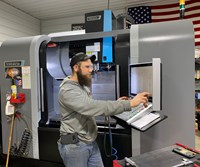
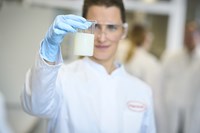
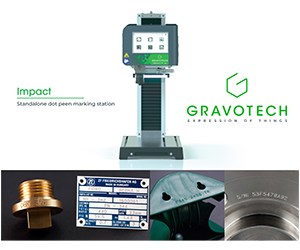

.png;maxWidth=300;quality=90)

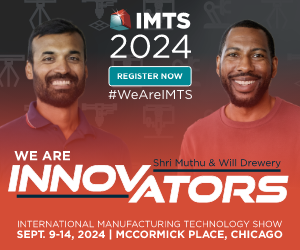
.png;maxWidth=300;quality=90)
